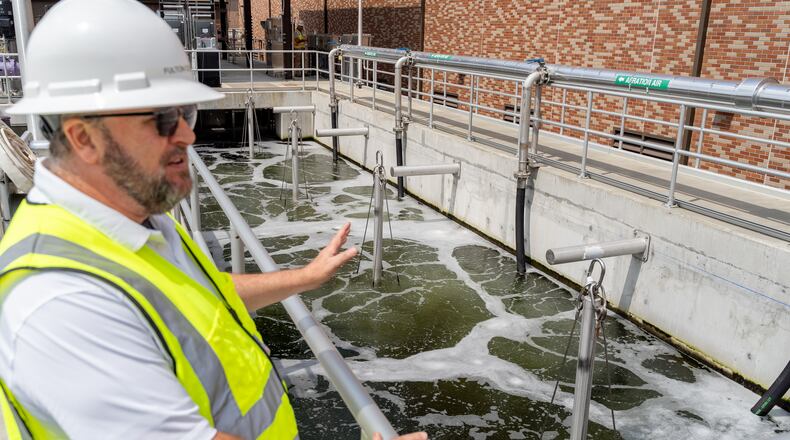The most expensive capital project in Fulton County’s history is coming online, enabling new development in a 70-square-mile area of north Fulton and parts of surrounding counties.
Expanding — really, rebuilding — the Big Creek Water Reclamation Facility at 1030 Marietta Highway is a $300 million project. An expanded electrical substation, new pipeline from Cobb County and other related features drove all associated costs up to $350 million.
The Big Creek plant serves half of Johns Creek, and large portions of Roswell (90%) and Alpharetta (80%). It also serves about 20% of Milton, said Fulton Public Works Director David Clark.
Fulton has intergovernmental agreements with Cobb, DeKalb and Forsyth counties for sewage treatment, and plant expansion synced with expected growth — mostly redevelopment — in the surrounding area, he said.
“It is by far our largest plant for north Fulton,” Clark said. The county also has the Little River Water Reclamation Facility and Johns Creek Environmental Campus on the north end.
Credit: Ben Hendren
Credit: Ben Hendren
The Big Creek plant is now the second-largest using a flat-plate membrane treatment system technology in the country, Clark said. Only Canton, Ohio, has one that’s slightly larger, he said.
The new plant can handle more water in less than half the space because it uses a different system that strains and settles out a lot of material before water reaches the biological process. Bacteria-covered membranes can filter or destroy just about everything else. Then treatment with ultraviolet light keeps any remaining viruses from reproducing, Clark said. Finally air is added to the water before it pours back into the Chattahoochee River.
“One of the things that we really wanted to do is let the entire thing work by gravity,” he said. The new cleaning system requires more power, but the increased electricity need there is offset by eliminating the need to pump water from one section to another, Clark said.
Credit: Ben Hendren
Credit: Ben Hendren
The large round tanks, previously used to let sediment settle out of water, will be repurposed as emergency storage, he said. Instead of heavy rains causing spills, now up to 6 million gallons of water can be held in those tanks.
The expansion increases the plant’s capacity from handling 24 million gallons of wastewater per day to 32 million. The plant upgrade and improvement in water quality garnered Fulton County recognition in achievement from the National Association of Counties.
Customers won’t notice a difference but Cobb County, with its water intake 2 miles downstream, is excited about the Big Creek project because the cleaner outflow from Fulton makes Cobb’s treatment less expensive, Clark said.
Clark led a tour Thursday for County Manager Dick Anderson and Commissioner Bob Ellis that traced the flow of water from its arrival at the plant through mesh sifters and field of bacteria-covered cleaning membranes.
“There’s about a dozen different types of bacteria, and each bacteria likes different things,” Clark said.
“It’s about 48 hours altogether from the time the wastewater enters the plant until it comes to here,” he said, pointing at a fall of clean water pouring into a pipe to the Chattahoochee River.
The plant has two odor-removal systems, and the buildings will have negative air pressure to keep smells indoors, Clark said.
Credit: Ben Hendren
Credit: Ben Hendren
Big as the new plant is, a sister plant in south Fulton is expected to be even larger. The Camp Creek Water Reclamation Facility now handles about 18 million gallons a day, but should hit its capacity of 24 million by the end of the decade, Clark said.
Anderson said Clark has met with Palmetto, Chattahoochee Hills and subdivision developers to forecast the area’s growth.
The Camp Creek plant will likely be expanded to handle up to 40 million gallons a day, Clark said. Construction should begin by 2030 and it should be operational in 2033, he said.
That could be a $400 million project, due largely to inflation and rising construction costs since the Big Creek work started. Big Creek came online in 1972.
“When we first started treating water here, it was about a half-million gallons a day,” Clark said. The plant has been expanded several times, with a 1992 expansion from 8 million gallons a day capacity to 24, he said.
But as the area continued to grow so did the need for water treatment. Other issues kept further expansion on hold until about 2016.
The new plant itself will be more compact, leaving room for future expansion and empty space as a buffer. Several buildings that are no longer needed will be torn down. There is even a corridor available for Roswell to connect its riverfront boardwalk to Marietta Highway, Clark said.
“We designed everything to last 50 years,” he said. All of the new equipment is designed to handle up to 38 million gallons a day, so if needed the plant could expand further, Clark said.
The plant has five new diesel generators on stand by, with 72 hours of fuel on site for emergencies.
Credit: Ben Hendren
Credit: Ben Hendren
About the Author
Keep Reading
The Latest
Featured







